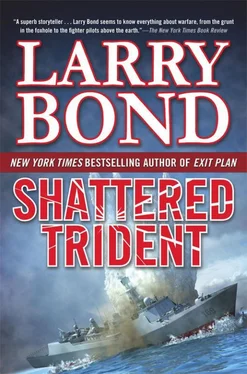They walked down the length of the shop, escorted by Warrant Four Harris, the officer in charge of the facility. The interior was crowded with not only navy torpedomen, but the nuclear weapons specialists of Thomas’s team. Complex mechanisms filled every corner of the shop. The sounds of different tools combined to form a constant background to their conversation.
Harris explained that the warhead sections from the torpedoes were easily removed and replaced with an exercise module. It was a straightforward process, and was covered by established maintenance procedures. “We normally separate the sections as part of a torpedo’s overhaul.”
“They fit?” Patterson asked. It was obvious they did, but she was curious.
Harris nodded. “Easily. We’re using W-80 warheads from Air Force B61 tactical nukes. The device is smaller in diameter and shorter, so volume isn’t an issue. It’s also not that far off weight-wise. The real challenge was securely mounting the warhead inside and then figuring out how to ballast the weapon so the torpedo’s center of gravity didn’t shift. That would have thrown the guidance completely off.”
They reached the far end of the shop, where the torpedoes already converted were being cased for shipment. Thomas said, “We’ll start loading the weapons onto the trucks shortly. There’s a C-17 prepped and waiting to take the weapons, you, my team, and our security detachment to Guam. If you’d like to rest, Warrant Officer Harris’s office—”
“That’s fine,” Patterson answered. “I’d like to stay here, if that’s all right. I’ll keep out of the way.” Maybe if she watched for a while, it would begin to sink in. She’d been going through the motions, doing what needed to be done, but the enormity of it all was overwhelming. She couldn’t decide if she was in shock or had just become numb.
She’d spent part of the flight out to Hawaii trying to determine more accurately how bad the environmental damage was going to be. Terms like “best case” and “conservative estimate” didn’t really seem appropriate. In the end, she could only draw broad limits around an unhappy answer, but the damage from the nuclear explosions was still going to be considerably less than what had already been inflicted by the sinking of nearly three dozen tankers. And then there was the political “fallout” that was likely to be just as devastating. But the war had already killed tens of thousands, and threatened to slip over the edge into a nuclear nightmare.
Any choice had costs. She could accept paying this price if it could stop a war.
14 September 2016
0830 Local Time
Littoral Alliance Headquarters
Okutama, Nishitama District
Tokyo, Japan
Minister Hisagi and Admiral Orihara filed out of the Hirano estate’s dojo along with the rest of the alliance’s formal working group members. It had been a short meeting. There was little to discuss militarily. Attacks against Chinese merchant ships had fallen to almost zero, and those attacks that took place were very close to the Chinese coast, where defenses were more robust. The South Korean representative reported that they had lost one of their Type 214 submarines near Qingdao in the Yellow Sea.
Submarine attacks against Chinese deep-ocean semi-submersible oil rigs were also disappointing. Only one oil rig had been sunk, requiring four torpedoes before it finally capsized. Another two were seriously damaged. Although they were assessed as repairable, they had temporarily stopped pumping oil. Unfortunately, the PLAN responded quickly to this new avenue of attack and began forward-deploying ASW helicopters to the oil rigs. Freed from their responsibility of patrolling the shipping lanes, Chinese maritime patrol aircraft now concentrated their ASW searches near the drill sites, further complicating the approach for alliance submarines.
There had been no cruise missile strikes in the last two days, while the attacking ships and submarines returned to base to rearm. Orihara again emphasized that Project Ryusei would help to alleviate the gaps between cruise missile strikes. Of greater concern were the reports from South Korea and Vietnam that they were running low on land-attack cruise missiles. The Korean representative said the production of the Hyunmoo 3 missiles had been stepped up, but it would be at least two weeks before the alliance would see an appreciable increase in their inventory. India promised to see what they could do to resupply Vietnam with 3M-14E Klub land-attack missiles. Unfortunately, a significant number of India’s stock had been expended in the opening attacks against the Pakistanis.
There was good news from the Vietnam front. Thanks to India’s transfer of two Su-30MKI Flanker squadrons, the Chinese Air Force had suffered considerable losses to their frontline air regiments. When combined with classic Vietnamese SAM traps, Chinese ground-support air strikes had been reduced by nearly half. Deprived of adequate air support, the Chinese Army’s advance had slowed significantly.
The working group took the “good news/bad news” update brief with guarded optimism, but the topic of discussion had nothing to do with the execution of the war. No, it dealt with the growing civil unrest in several Littoral Alliance nations. Tokyo, Seoul, Taipei, and Hanoi had all had large civilian demonstrations demanding an end to hostilities. Much of the anger behind the protests was directly tied to the Chinese ballistic missile attacks on the capital cities, but a number of Internet blogs and social networking sites were throwing gasoline on the fire. One Japanese Web site had leaked the existence of the Beidou jamming system, and claimed the military was using the civilian population as a shield. Hisagi was incensed.
“The individual responsible should be tried for treason,” he hissed.
Orihara laughed cynically. “The leak was undoubtedly a Chinese information operation targeted against the people of our nations’ capitals. They either discovered or deduced the countermeasure we put in place, and are now trying to shift the blame on to us for the civilian deaths.”
“The Internet is proving to be a curse,” Hisagi grumbled.
“Indeed, and some Web sites are far more damaging than others. Take that Bywater site, for example.”
“You mean the one run by the Canadian?”
“Yes! He is particularly well informed. He must have spies all over the world!” Orihara vented. “His recent analysis on the mining of Liaoning was disturbingly accurate. It was as if he was reading our own after-action reports.”
Hisagi stopped dead in his tracks and grabbed the admiral by the arm; there was great concern on the foreign minister’s face. “Are you suggesting someone in the alliance is feeding him information?”
Orihara sighed. “I don’t know, Shuhei-san. It’s a possibility, but this McMurtrie fellow is, by all accounts, a very bright man. His rendition of the Battle of Spratly Island was even more detailed than the Vietnamese Navy’s official report. Regardless, his blog has a huge following within the alliance and throughout the world. And now that he’s working for CNN, his postings carry even greater weight, and they are not necessarily in our best interest.”
Both men suddenly went silent as they saw Komamura walking down the hall toward his office. His head was down, his posture slumped, and his feet moved in uneven small steps. Hisagi shook his head in disappointment and pity. “He’s been drinking again.”
“I’m afraid so,” Orihara replied sternly. “He’s been very depressed since his discovery of the improved warhead. That knowledge is weighing heavily on him.”
Читать дальше

![Никки Сикс - Героиновые дневники. Год из жизни павшей рок-звезды[The Heroin Diaries - A Year in the Life of a Shattered Rock Star]](/books/78612/nikki-siks-geroinovye-dnevniki-god-iz-zhizni-pavshej-rok-zvezdy-the-heroin-diaries-a-yea-thumb.webp)










